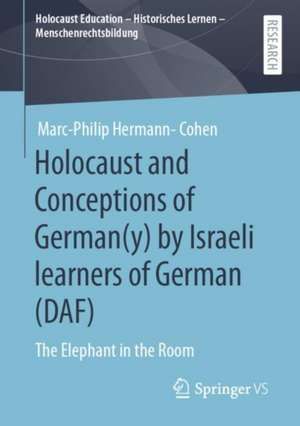Holocaust and Conceptions of German(y) by Israeli learners of German (DAF): The Elephant in the Room: Holocaust Education – Historisches Lernen – Menschenrechtsbildung
Autor Marc-Philip Hermann-Cohenen Limba Engleză Paperback – 18 iun 2021
The Holocaust is inseparable from the Israeli identities even seven decades following the atrocities during World War II, Israeli daily life is shaped by the horrible crimes committed by the Nazis. This book conceptualizes the intricacies of the Israeli identity in relation to learning German as a foreign language (GFL) in Israel throughout the course of history and the changing conception of Germany.
This book includes an analysis of a selection of twenty-five GFL language books which reflect the stigmatization and tabooization of the Holocaust and also the qualitative analysis of a subject pool of 105 learners of GFL. The author finds that identities are co-constituted by four individualized Thought Styles, a concept borrowed from Ludwik Fleck. Thought Styles capture the individual perspective of the language learner’s view of Germany and are categorized in this thesis as German Engineering, Cold Germany, Neo-Nazi Germany, and The Other Germany. The researchdraws from discourse theory, critical psychology, and the oft-overlooked classical theory of Ludwik Fleck. Although the relationship between Germany and Israel has been amicable for the last six decades, the choice for Israelis to learn the language that was used by a nation that once attempted to eradicate the Jewish people is emotive and infinitely complex.
Preț: 576.74 lei
Preț vechi: 678.52 lei
-15% Nou
Puncte Express: 865
Preț estimativ în valută:
110.36€ • 115.52$ • 91.85£
110.36€ • 115.52$ • 91.85£
Carte tipărită la comandă
Livrare economică 31 martie-14 aprilie
Preluare comenzi: 021 569.72.76
Specificații
ISBN-13: 9783658342111
ISBN-10: 3658342110
Pagini: 141
Ilustrații: XVI, 141 p. 38 illus., 16 illus. in color.
Dimensiuni: 148 x 210 x 14 mm
Greutate: 0.22 kg
Ediția:1st ed. 2021
Editura: Springer Fachmedien Wiesbaden
Colecția Springer VS
Seria Holocaust Education – Historisches Lernen – Menschenrechtsbildung
Locul publicării:Wiesbaden, Germany
ISBN-10: 3658342110
Pagini: 141
Ilustrații: XVI, 141 p. 38 illus., 16 illus. in color.
Dimensiuni: 148 x 210 x 14 mm
Greutate: 0.22 kg
Ediția:1st ed. 2021
Editura: Springer Fachmedien Wiesbaden
Colecția Springer VS
Seria Holocaust Education – Historisches Lernen – Menschenrechtsbildung
Locul publicării:Wiesbaden, Germany
Cuprins
Introduction.- Theoretical Implications.- Methodology.- Results.- Limitations of the Research.- Thought Styles about Germany.- Conclusions.
Notă biografică
About the author
Marc-Philip Hermann-Cohen is a certified teaching professional with experience in German school system teaching English, Social Sciences, History and Psychology. He also held the position of special education coordinator.
Textul de pe ultima copertă
The Holocaust is inseparable from the Israeli identities even seven decades following the atrocities during World War II, Israeli daily life is shaped by the horrible crimes committed by the Nazis. This book conceptualizes the intricacies of the Israeli identity in relation to learning German as a foreign language (GFL) in Israel throughout the course of history and the changing conception of Germany.
This book includes an analysis of a selection of twenty-five GFL language books which reflect the stigmatization and tabooization of the Holocaust and also the qualitative analysis of a subject pool of 105 learners of GFL. The author finds that identities are co-constituted by four individualized Thought Styles, a concept borrowed from Ludwik Fleck. Thought Styles capture the individual perspective of the language learner’s view of Germany and are categorized in this thesis as German Engineering, Cold Germany, Neo-Nazi Germany, and The Other Germany. The research draws from discourse theory, critical psychology, and the oft-overlooked classical theory of Ludwik Fleck. Although the relationship between Germany and Israel has been amicable for the last six decades, the choice for Israelis to learn the language that was used by a nation that once attempted to eradicate the Jewish people is emotive and infinitely complex.
About the author
Marc-Philip Hermann-Cohen is a certified teaching professional with experience in German school system teaching English, Social Sciences, History and Psychology. He also held the position of special education coordinator.




